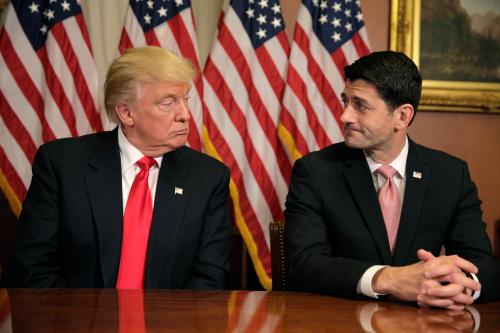In the six years since enactment of the Affordable Care Act, Republicans have sworn that, given the chance, they would “repeal and replace” it. Now they need to deliver. Repeal should be relatively simple. Enacting a replacement and implementing it won’t be. And repeal without having an agreed-on plan for replacement in place is a recipe for calamity, as a new Urban Institute study shows.
Repeal is easy because Senate rules allow a simple majority, rather than a filibuster-proof 60-vote majority, to pass measures called for in a budget resolution that affect only taxes and mandatory spending.
So a Republican-controlled Congress has undoubted power to end key provisions of the ACA: the expansion of Medicaid; subsidies for most of those purchasing individual coverage in the health-care marketplaces; and tax penalties to enforce the mandate that individuals obtain insurance and the requirement imposed on medium and large employers to offer coverage. Indeed, Congress did this in January only to confront a veto by President Obama.
President Trump would sign such a measure—yet the 2016 election may have made the replacement part of the effort harder. As a candidate and president-elect, Donald Trump made promises that will be very hard to keep about what his health policy would accomplish. He vowed to sustain or broaden coverage, make health care more affordable, improve quality of care and cut government health-care spending.
Achieving these goals simultaneously may be impossible. Over the past six years, Republicans have come up with several replacement plans. But none has consensus support even among Republicans – and none has been evaluated to determine whether it meets the incoming president’s goals, including his promise to retain protections for those with preexisting conditions.
Furthermore, any effort to repeal Obamacare’s insurance regulations and a very long and diverse menu of provisions, and any replacement for them, will likely be subject to a Senate filibuster. And that means that the 52 Senate Republicans will need Democratic support to pass a bill in the Senate.
With repeal relatively easy, and replacement very hard, it is critical to consider what would happen if the budget-related
provisions of the ACA were repealed before there was agreement on replacement legislation. This is the question to which the Urban Institute study provides an answer. It isn’t pretty.
Ending those parts of the ACA that can be repealed without the threat of a Senate filibuster and delaying implementation for two years would leave more people without insurance than would have been the case if the law had never been passed, the study finds. Those actions would increase the number of people without health insurance by nearly 30 million in 2019. Of those losing insurance, 82 percent would be in working families, 56 percent would be non-Hispanic whites and more than half of the adults would have a high school education or less. A quarter would be poor. In those states that chose to expand Medicaid, the number of uninsured people would more than double, from 14 million to 33 million.
Meanwhile, because fewer people would have insurance, the price tag for uncompensated care would skyrocket—by an estimated $1.1 trillion over the succeeding decade. That number would translate into some combination of less income for hospitals, doctors and other health-care providers, increased fiscal burdens for state and local governments, more personal bankruptcies and less health care for sick people.
The bill Obama vetoed would have repealed, effective immediately, the unpopular penalties imposed on those who fail to carry adequate health insurance (the individual mandate). If that provision were enacted in 2017, the market in which individuals buy coverage would instantly start to unravel. An estimated 4 million mostly healthy people would drop coverage, leaving insurers with a pool of sicker- and costlier-than-average customers.
Because rates for 2017 were set in 2016 and cannot readily be changed, many insurers would be sure to lose money in 2017. Premiums for 2018 would soar. Faced with losses, shrinking numbers of participants and uncertainty about what, if any, system might replace Obamacare, many insurers would flee the ACA marketplaces.
We believe that the ACA, though not without flaws, has been a remarkable success. Insurance coverage has risen. Growth of spending has slowed. It would be better to fix its flaws than destroy its accomplishments. But if ACA critics insist on repeal, then they should wait until Republicans and Democrats working together can devise a plan that deals with health insurance comprehensively—and in a way that will overcome any filibuster. If the past six years have taught us anything, it is that fundamental legislation reshaping nearly one-fifth of the U.S. economy and affecting the lives of almost every legal resident must have the support of at least a sizable chunk of both major political parties if it is to win lasting political acceptance.
The Brookings Institution is committed to quality, independence, and impact.
We are supported by a diverse array of funders. In line with our values and policies, each Brookings publication represents the sole views of its author(s).







Commentary
Op-edRepealing Obamacare without replacing it would be a disaster
December 7, 2016